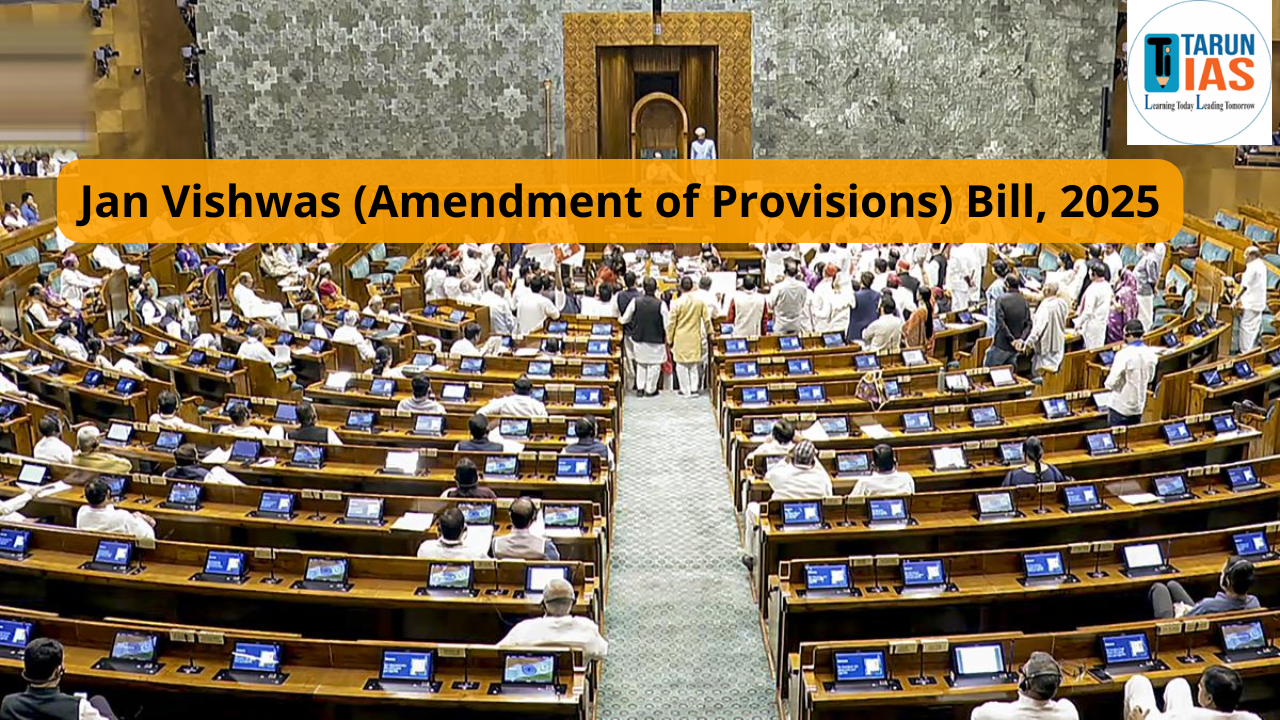Jan Vishwas (Amendment of Provisions) Bill, 2025 Introduction
- The Indian Government recently introduced the Jan Vishwas (Amendment of Provisions) Bill, 2025 in the Lok Sabha, signaling a continued push towards simplifying laws and reducing criminal liability for minor offences.
- This Bill aims to amend 16 Central Acts, focusing on decriminalization and rationalization of penalties, thereby making compliance easier for individuals and businesses alike.
Key Objectives of the 2025 Bill
- Decriminalization of Minor Offenses: The Bill proposes to decriminalize 288 provisions across 16 Central Acts, with a primary focus on minor, procedural, or technical defaults.
-
-
- Imprisonment clauses for these offenses are replaced with warnings or monetary penalties.
- Example: Non-compliance under the Electricity Act, 2023, which previously carried up to 3 months of imprisonment, will now attract fines ranging from ₹10,000 to ₹10 lakh.
-
- Promoting Ease of Living and Doing Business: The legislation targets a total of 355 provisions, including:
-
-
- Decriminalization of 288 provisions to support ease of doing business.
- The bill also proposes 67 amendments under New Delhi Municipal Council Act, 1994 (NDMC Act) and Motor Vehicles Act, 1988 to facilitate ease of living.
-
- Rationalization of Penalties: The Bill introduces proportional and graduated penalties to maintain a balanced deterrent effect:
-
-
- Fines and penalties will automatically increase by 10% every three years, eliminating the need for repeated legislative amendments.
- This ensures that penalties remain relevant and effective without being punitive.
- For instance, in the Central Silk Board Act, 1948, it has been proposed that the imprisonment of up to one year and fine up to ₹1,000 be converted to only warning for the first instance of contravention and penalty (₹25,000-1 lakh) for continuing offences for furnishing any false statement.
-
- Adjudication Mechanisms: To reduce judicial burden and speed up resolution of minor offenses, the Bill establishes:
-
-
- Adjudicating officers to handle penalties through administrative processes.
- Appellate authorities for reviewing these decisions, ensuring fairness and accountability.
- These mechanisms aim to streamline enforcement, while keeping courts focused on serious legal matters.
-
- Focus on First-Time Offenders: The Bill adopts a “warn-correct-penalize” model:
-
-
- For 76 offenses across 10 Acts, first-time offenders will receive a warning or improvement notice.
- This approach shifts from immediate penal action to opportunities for compliance, promoting responsible behavior.
-
- Amendments to Specific Acts: The Bill proposes targeted amendments to various laws, including:
-
- Motor Vehicles Act, 1988: Simplifying vehicle registration and introducing grace periods for driving license renewals.
- New Delhi Municipal Council Act, 1994: Streamlining compliance processes.
- Drugs and Cosmetics Act, 1940: Rationalizing procedures and penalties.
- These changes aim to reduce complexity, improve efficiency, and protect citizens from unnecessary criminal prosecution.
Why is the Need for Jan Vishwas 2.0?
- Tackling Over-Criminalization of Minor Offenses:
-
-
- Many Central laws in India still prescribe criminal penalties—including imprisonment—for minor, technical, or procedural violations.
- These offenses include small paperwork errors or trivial non-compliances, which do not warrant incarceration.
- Studies indicate that over 75% of criminal provisions regulate areas outside core criminal justice, creating unnecessary legal hurdles and fear among businesses and citizens.
- Jan Vishwas 2.0 seeks to decriminalize such minor violations, replacing jail terms with warnings or monetary penalties.
-
- Removing Barriers to Ease of Doing Business and Daily Life:
-
-
- Harsh punitive provisions have often had a chilling effect on entrepreneurship and innovation, discouraging honest actors from engaging fully in economic and social activities.
- A 2022 Observer Research Foundation report highlighted that among 1,536 laws governing business in India, more than half carry imprisonment clauses, and over 50% of these clauses mandate sentences of at least one year.
- By reducing the risk of imprisonment for minor infractions, Jan Vishwas 2.0 promotes business-friendly reforms, supporting initiatives like “Make in India” and helping India emerge as a global investment and manufacturing hub.
-
- Reducing the Burden on the Judiciary:
-
-
- India’s courts have been overloaded with cases arising from minor offenses, causing long delays and pendency, and diverting attention from serious criminal and civil matters.
- According to the National Judicial Data Grid, over 3.6 crore criminal cases are pending in district courts, with more than 2.3 crore cases pending for over a year.
- The first Jan Vishwas Act, 2023, was introduced to reduce minor case filings, helping courts focus on substantial legal disputes and ensure more effective justice delivery.
-
- Modernizing Outdated and Colonial-Era Regulations:
-
-
- Many existing laws contain archaic provisions that are irrelevant in today’s technological and business landscape.
- Jan Vishwas 2.0 aims to update these laws, ensuring that legal frameworks are aligned with contemporary needs.
- Technology-driven compliance mechanisms are encouraged to simplify regulatory processes, making enforcement more efficient and transparent.
-
- Supporting ‘Minimum Government, Maximum Governance’: The Bill underscores the government’s commitment to:
-
- Eliminate outdated laws, reducing bureaucratic hurdles.
- Support business-friendly reforms under initiatives like Make in India.
- Align India’s regulatory framework with global best practices, promoting transparency, accountability, and efficiency.
Way Forward
- Jan Vishwas 2.0 is a landmark step in creating a simplified, citizen-centric, and business-friendly legal environment.
- By decriminalizing minor offenses, reducing court burden, modernizing outdated laws, and embracing technology, the Bill strengthens India’s vision of ‘Minimum Government, Maximum Governance’.
- Overall, it fosters ease of living, promotes compliance, and supports entrepreneurship, making India a more predictable and investor-friendly nation.















